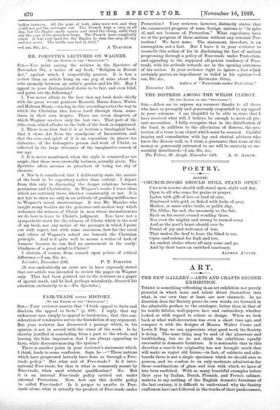MR. FORSYTH'S LECTURES ON WAGNER.
[To THE EDITOR OF THE "SPECTATOR."
Stu,---You print among the reviews in the Spectator of November 9th, a notice of my book, "Religion in Recent Art," against which I respectfully protest. It is less a review than an article hung on one peg of mine about the trite anomaly between an artist's genius and his life. May I appeal to your distinguished desire to be fair, and even kind, and point out the following?
1. You never allude to the fact that my book deals chiefly with the great recent painters Rossetti, Burne Jones, Watts, and Holman Hunt—tracing in this ascending series the way in which the Christian idea forces itself through them, some- times in their own despite. There are seven chapters, of which Wagner receives only the last two. That part of the title, even, which alludes to the bulk of the book, is suppressed.
2. There is no hint that it is at bottom a theological book, that it views Art from the standpoint of Incarnation, and that the core and spirit of it is an exposition (in places too elaborate) of the redemptive person and work of Christ, as reflected in the large utterance of the imaginative reason of our age.
3. It is never mentioned, when the style is censured as too ample, that these were avowedly lectures, actually given. The Spectator often accuses us preachers of being too shy of rhetoric.
4. Nor is it considered that I deliberately state the nature of the book to be expository rather than critical. I depart from this only in discussing the deeper relations between pessimism and Christianity. In Wagner's works I trace ideas which are certainly there, whether consistently or not. It is not fair to show me only in an attitude of gushing indifference to Wagner's moral shortcomings. It was Mr. Maurice who taught many besides me the generous and modest way which welcomes the witness of Christ in men whose inconsistencies we do best to leave to Christ's judgment. You have not a sympathetic word for the witness of Christ which is the soul of my book, nor any notice of the passages in which I point out with regret, but with some exactness, how far the creed and ethics of Wagner's school are beneath the Christian principle. And is it quite well to accuse a writer of lack of humour because he can find no amusement in the (early) blindness of a great mind to Christ ?
[It was undoubtedly an error not to have expressly stated that our article was intended to review the paper on Wagner only. That had been pointed out to the reviewer as a paper of special mark, and he had, perhaps mistakenly, directed his attention exclusively to it.—ED. Spectator.]


















































 Previous page
Previous page